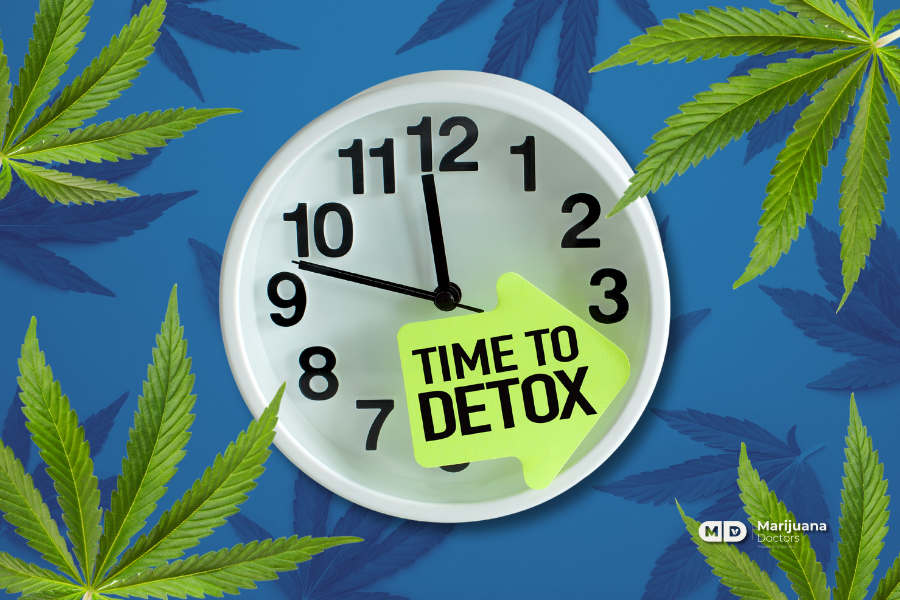
Detoxing from weed can be important, whether you’re preparing for a drug test or aiming to reset your tolerance. Marijuana’s main psychoactive component, THC, lingers in the body for varying amounts of time depending on the frequency of use, metabolism, and other factors.
This article explores how long THC stays in your system, detox timelines, and effective strategies for cleansing your body. Knowing the detox process helps you choose the most appropriate approach for your needs.
The time marijuana stays in your system is mainly influenced by THC, the active compound in cannabis. Unlike substances that quickly flush out, THC binds to fat cells and can be detected for extended periods of time even after you’ve stopped use. Various factors determine this exact duration, including:
The detox process from marijuana varies greatly depending on usage patterns. Detoxing can take as little as a week for light users but may extend to a month or longer for heavy or daily users. Regular detox involves letting your body naturally metabolize and eliminate THC. However, there are ways to potentially speed up the process, though they won’t eliminate THC overnight.
Several methods, like increasing hydration and boosting metabolism, are commonly believed to help flush THC from the system faster. Staying hydrated helps dilute the concentration of THC metabolites in the body, allowing the kidneys to filter them more efficiently. Also, engaging in physical exercise can increase metabolism, helping to burn fat cells where THC is stored, releasing it into the bloodstream for elimination. However, despite these methods, time remains the most critical factor, as the body needs an ample amount of it to detox and fully eliminate THC from its fat stores naturally.
While marijuana will naturally leave the body over time, some methods can support the detox process. Below are some tips to help accelerate the removal of THC from your body:
Water is crucial for flushing out toxins from your system. Hydration helps the kidneys process and remove THC metabolites via urine. Drinking plenty of water can dilute the concentration of THC in the body, aiding in a quicker detox.
Because THC binds to fat cells, engaging in regular cardiovascular exercise or strength training helps burn fat and release THC. Activities such as running, cycling, or swimming can boost metabolism and encourage the release of THC through sweat.
Diet plays a significant role in detoxification. Consuming high-fiber foods, fruits, and vegetables aids digestion and elimination. Avoiding processed foods, alcohol, and sugar is also essential, as they can slow down the detox process.
Supplements rich in vitamins and minerals can also support the body’s detox systems. Niacin (Vitamin B3), spirulina, and chlorella are common supplements that detox advocates use to enhance the body’s natural cleansing mechanisms.
Detoxing from weed can be a time-consuming process. Still, with the right strategies in place—like hydration, exercise, and proper diet—you can help support your body in eliminating THC more effectively. Whether you’re detoxing for a drug test or simply looking to reset your tolerance, a well-planned detox can yield positive results.
The best way to detox from weed is through natural methods such as staying hydrated, exercising, and eating a clean diet. Combining these with detox supplements like spirulina and chlorella can further support the detox process. If you need a faster detox, there are commercial detox kits, though their efficacy is debated.
THC and other cannabis metabolites are removed from the body through urine, sweat, and feces. The liver, kidneys, and colon all play crucial roles in breaking down and eliminating these substances. Regular hydration, exercise, and a clean diet can help accelerate the removal process.
For light users, marijuana may stay in the system for about three days. Moderate users may see detection windows for up to a week, while heavy or chronic users may carry THC metabolites for 30 days or more.
Weed dependence is diagnosed through a combination of psychological assessments and behavior patterns. Common signs include an inability to stop using marijuana despite negative consequences, withdrawal symptoms, and prioritizing cannabis use over responsibilities or social obligations.
Marijuana drug tests typically screen for THC metabolites in the body. The most common type is a urine test, which can detect THC for up to 30 days, depending on the user’s consumption habits. Other tests, like blood, hair, and saliva tests, may detect marijuana for different durations, with hair tests showing traces for up to 90 days.
No Information on MarijuanaDoctors.Com should be used to diagnose, treat, prevent or cure any disease or condition. You can view our Full Disclaimer here.